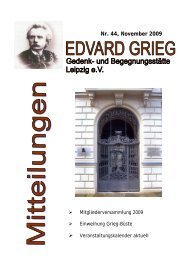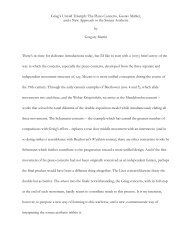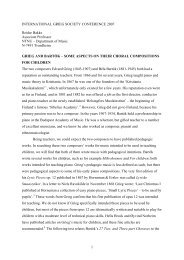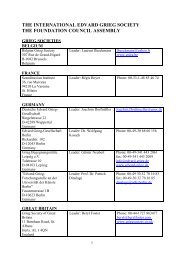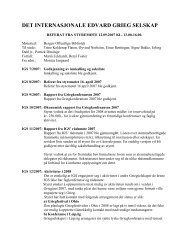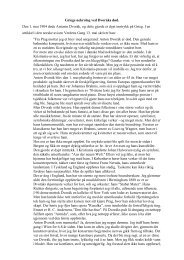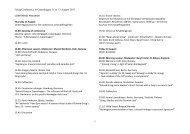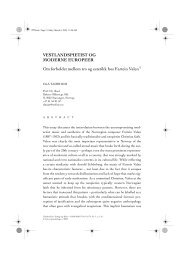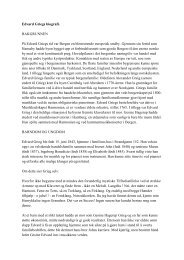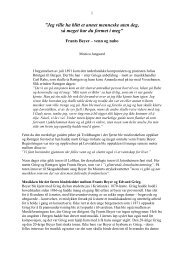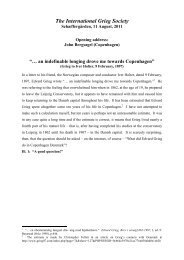Gregory Martin - paper 2007 - Grieg Society
Gregory Martin - paper 2007 - Grieg Society
Gregory Martin - paper 2007 - Grieg Society
Create successful ePaper yourself
Turn your PDF publications into a flip-book with our unique Google optimized e-Paper software.
lifting the saga from its pages and returning it to its place as an aural experience for its<br />
audience. 59<br />
Ultimately, the Ballade is a précis of what the composer deemed quintessentially<br />
Norwegian: “a deep sense of melancholy that can suddenly change into wild, unbridled<br />
humor. Mysterious gloom and unrestrained wildness—these are the contrasting elements<br />
in the Norwegian folk song.” 60 Indeed, it seems just these two polarities that he has<br />
marked in his work, as the affectively Baroque lament texture of the theme is transformed<br />
into a barbaric dance of runic song then abruptly juxtaposed back against its original<br />
countenance, met along the way with both the funereal and the jocular. This ideal<br />
reflection of his people’s temperament in music lead Walter Niemann to aver that the<br />
Ballade is “the most perfect embodiment of Norway and the Norwegian people, of its<br />
agonized longing for light and sun, and at the same time the most perfect embodiment of<br />
<strong>Grieg</strong> the man.” 61 In other words, it may be used to expose the irony in <strong>Grieg</strong>’s own<br />
assertion: “I make no pretension of being in the class with Bach, Mozart, and Beethoven.<br />
Their works are eternal, while I wrote for my day and generation.” 62 By writing for the<br />
people of his time in their language, and founding his saga in tradition and generations,<br />
he has chosen the tried and lasting experience of the storyteller, rather than a more<br />
disposable immediacy. As storyteller, he, “hammer in hand, like Ibsen’s Miner, makes<br />
his way to the very heart of the hidden secrets.” 63<br />
59 With its relationship to the stanzaic structures often found within the sagas, however, he has set his work<br />
in a broader socio-historical context—as a flokk is a part of the larger story, so his contribution is part of<br />
something greater—and, as verse acted as an historical footnote in the sagas, so is the Ballade a footnote to<br />
a specific time in the history of Norway.<br />
60 <strong>Grieg</strong>, Letters, 231.<br />
61 Walter Niemann, quoted in Henry Finck, <strong>Grieg</strong> and His Music (New York: J. Lane Co., 1910), 207.<br />
62 Edvard <strong>Grieg</strong> quoted in Finn Benestad and Dag Schjelderup-Ebbe, Edvard <strong>Grieg</strong>, Chamber Music (Oslo:<br />
Scandinavian University Press; New York: Oxford University Press, 1993), 181.<br />
63 <strong>Grieg</strong>, Diaries, 68.<br />
30



